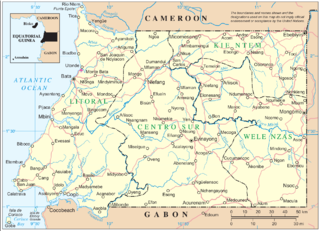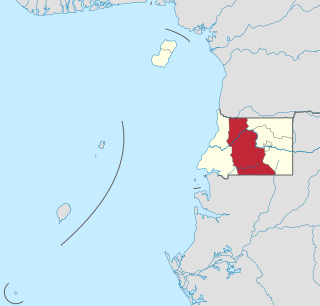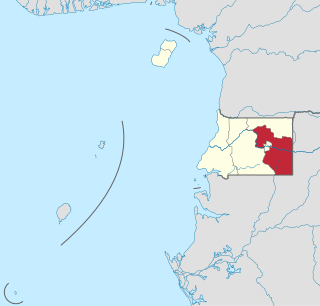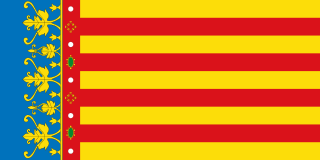
Equatorial Guinea, officially the Republic of Equatorial Guinea, is a country on the west coast of Central Africa, with an area of 28,000 square kilometres (11,000 sq mi). Formerly the colony of Spanish Guinea, its post-independence name refers to its location near both the Equator and in the African region of Guinea. As of 2024, the country had a population of 1,795,834, over 85% of whom are members of the Fang people, the country's dominant ethnic group. The Bubi people, indigenous to Bioko, are the second largest group at approximately 6.5% of the population.

La Paz, officially Nuestra Señora de La Paz, is the seat of government of the Plurinational State of Bolivia. With 755,732 residents as of 2024, La Paz is the third-most populous city in Bolivia. Its metropolitan area, which is formed by La Paz, El Alto, Achocalla, Viacha, and Mecapaca makes up the second most populous urban area in Bolivia, with a population of 2.2 million, after Santa Cruz de la Sierra with a population of 2.3 million. It is also the capital of the La Paz Department.

Murcia is a city in south-eastern Spain, the capital and most populous city of the autonomous community of the Region of Murcia, and the seventh largest city in the country. It had a population of 460,349 inhabitants in 2021. The total population of the metropolitan area was 672,773 in 2020, covering an urban area of 1,230.9 km2. It is located on the Segura River, in the southeast of the Iberian Peninsula. It has a climate with hot summers, mild winters, and relatively low precipitation.

The State of Mexico, officially just Mexico, is one of the 32 federal entities of Mexico. Commonly known as Edomex to distinguish it from the name of the whole country, it is the most populous, as well as the second most densely populated, state in the country.

Río Muni is the Continental Region of Equatorial Guinea, and comprises the mainland geographical region, covering 26,017 square kilometres (10,045 sq mi). The name is derived from the Muni River, along which the early Europeans had built the Muni River Settlements.

Santa Cruz de Tenerife, commonly abbreviated as Santa Cruz, is a city, the capital of the island of Tenerife, Province of Santa Cruz de Tenerife, and one of the capitals of the Canary Islands, along with Las Palmas. Santa Cruz has a population of 206,593 (2013) within its administrative limits. The urban zone of Santa Cruz extends beyond the city limits with a population of 507,306 and 538,000 within urban area. It is the second largest city in the Canary Islands and the main city on the island of Tenerife, with nearly half of the island's population living in or around it.

Spanish Guinea was a set of insular and continental territories controlled by Spain from 1778 in the Gulf of Guinea and on the Bight of Bonny, in Central Africa. It gained independence in 1968 as Equatorial Guinea.
The Beti-Pahuin are a Bantu ethnic group located in Center region of Cameroon. Though they separate themselves into several individual clans, they all share a common origin, history and culture. Estimated to be well over 8 million individuals in the early 21st century, they form the largest ethnic group in central Cameroon and its capital city of Yaounde. Their Beti languages are mutually intelligible.
Seville or Sevilla can refer to several cities, towns, and municipalities.

Centro Sur is a province of Equatorial Guinea. Its capital is Evinayong.

Wele-nzas is a province in the eastern portion of continental Equatorial Guinea. Its capital is Mongomo. It borders the Equatoguinean provinces of Centro sur to the west and Kie-ntem to the north, with Gabon's Woleu-Ntem Province to the east and south. As of 2015, the population of Wele-nzas was 192,017. It derives its name from the Benito River and the Piedra Nzas mountain range.
Juvenal Edjogo Owono Montalbán, known mononymously as Juvenal, is a football manager and former professional player who operated as a midfielder. Born and raised in Spain to an Equatoguinean father and a Spanish mother, he capped for the Equatorial Guinea national team.
The Equatoguinean Cup is the top knockout tournament of the Equatoguinean football. Its full name is Equatoguinean Cup - King's Cup Abudunal Sun. It was created in 1974.

The Valencian Community is an autonomous community of Spain. It is the fourth most populous Spanish autonomous community after Andalusia, Catalonia and the Community of Madrid with more than five million inhabitants. Its homonymous capital Valencia is the third largest city and metropolitan area in Spain. It is located along the Mediterranean coast on the east side of the Iberian Peninsula. It borders Catalonia to the north, Aragon and Castilla–La Mancha to the west, and Murcia to the south, and the Balearic Islands are to its east. The Valencian Community is divided into three provinces: Castellón, Valencia and Alicante.

Cartagena is a Spanish city and a major naval station on the Mediterranean coast, south-eastern Iberia. As of January 2018, it has a population of 218,943 inhabitants. This makes Cartagena Murcia's second-largest municipality and Spain's sixth-largest city that is not a provincial-capital. The wider urban or metropolitan area of Cartagena, known as Campo de Cartagena, has a population of 409,586 inhabitants.

Madrid is the capital and most populous municipality of Spain. It has almost 3.4 million inhabitants and a metropolitan area population of approximately 7 million. It is the second-largest city in the European Union (EU), and its monocentric metropolitan area is the second-largest in the EU. The municipality covers 604.3 km2 (233.3 sq mi) geographical area. Madrid lies on the River Manzanares in the central part of the Iberian Peninsula at about 650 meters above mean sea level. The capital city of both Spain and the surrounding autonomous community of Madrid, it is also the political, economic, and cultural centre of the country. The climate of Madrid features hot summers and cool winters. The primitive core of Madrid, a walled military outpost, dates back to the late 9th century, under the Emirate of Córdoba. Conquered by Christians in 1083 or 1085, it consolidated in the Late Middle Ages as a sizeable town of the Crown of Castile. The development of Madrid as administrative centre fostered after 1561, as it became the permanent seat of the court of the Hispanic Monarchy.
Acacio Mane Elah, was one of the first Equatorial Guinean nationalist and independence leaders.
Deportivo Niefang is an Equatoguinean football club based in the city of Niefang.
The 2018 Equatoguinean Primera División is the 40th season of the Equatoguinean Primera División, the top-tier football league in Equatorial Guinea, since its establishment in 1979. The season started on 26 May 2018.












